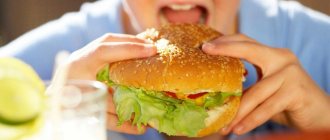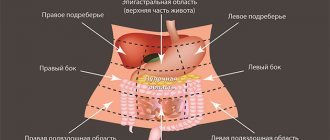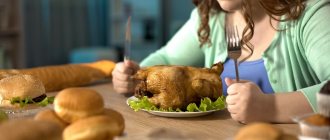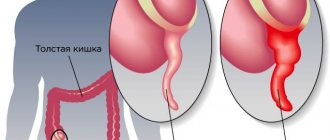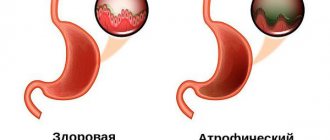To get rid of excess weight and not gain weight, you need to control the volume of portions, and even better, create a menu taking into account the number of calories, as well as the ratio of proteins, fats and carbohydrates. However, proper nutrition, which eliminates uncontrolled overeating, is not easy to adhere to. For some people, this is simply impossible, since immediately after a full meal they feel hungry. To lose weight without the risk of binge eating and without harm to your health, you need to enlist the support of specialists. The Doctor Bormental clinic uses its own patented method of losing weight and maintaining results, with the help of which more than half a million people have already lost weight. Read more about her here.
Eating habits
The most common type of eating disorder is uncontrolled consumption of food for pleasure. That is, people eat not because they are hungry, but because they are used to just constantly chewing something. But there are bad eating habits that lead to an uncomfortable state of constantly feeling hungry. Let's take a closer look at them.
Dehydration
Some people confuse the feeling of hunger and thirst. This is a rather dangerous, but easily correctable eating disorder. The thing is that the hypothalamus signals about a lack of food and a lack of water. If for many years a person paid great attention to food, while ignoring the drinking regime, the states of hunger and thirst could become confused in his system of self-awareness.
In this version, when a person needs a drink, he begins to eat. As a result, water deficiency becomes even greater and signs of dehydration appear. To get rid of this condition, you just need to instill in yourself the habit of drinking a lot of water (at least 2 liters per day).
Poor nutrition
For full functioning, the body requires fats, proteins, and carbohydrates. If a person’s diet is monotonous and does not include one or another necessary component, the hypothalamus signals that the food received is not enough. As a result, the person continues to eat, but the feeling of hunger still persists. A nutritionist will help you cope with this problem, creating a properly balanced menu and eliminating the risk of overeating.
Wrong nutrition schedule
Doctors recommend that everyone who has problems with eating behavior switch to fractional meals with a clearly defined meal schedule. With fractional meals, a person eats 5 or 6 times a day. An incorrect schedule is a complete lack of a schedule or eating with large time intervals between meals. In the first case, a person accustoms his stomach to the fact that food arrives at any time, regardless of whether the food received earlier has been digested. The result is that the body begins to demand food constantly.
In the case of large gaps between meals, the hormone ghrelin can be produced, which forces you to eat in reserve. A person sits down at the table, being very hungry, and then, when he starts eating, he simply cannot stop.
Eating disorders
Bulimia (“ox”, “wolf” hunger, lycorexia, polyphagia, kinorexia) is an excessive and insatiable feeling of hunger with the consumption of very large amounts of food, often for a long time. Eating excessive amounts of food may be associated with disinhibition of food needs - sitiomania.
1. Primary bulimia is caused by endocrine disorders, organic lesions of the interstitial-diencephalic region of the brain of various origins (trauma, hemorrhage, Kleine-Lewin syndrome, Kluver-Bucy syndrome, tumors, etc.). This pathology can also be associated with a mental disorder; bulimia in such cases will obviously be primary.
2. Mental bulimia is directly related to mental disorders and is heterogeneous.
In diseases such as atrophic processes, senile dementia, progressive paralysis, catatonic schizophrenia, other various types of dementia and profound mental retardation, excessive food consumption is associated primarily with disinhibition of the impulse to eat. Panthophagy or euryphagy is typical - patients eat everything that catches their eye. If they do not distinguish between edible and inedible, they devour paper, rags, sand, clay, cement, eggshells, etc.
| | Find out how bulimia is treated in our psychiatric clinic |
Bulimia is often observed in manic states, in which the intensity of various impulses increases many times, this also applies to food. Patients eat often, a lot, with pleasure, but nevertheless do not go beyond certain limits. They also retain their appetite, that is, their preference for certain types of food. They also begin to eat foods that previously caused disgust. Patients with severe mania become very indiscriminate in their diet, they can eat spoiled foods, confident that they will not get food poisoning or infection.
Depressive bulimia occurs in states of mild anxious depression. As depression deepens, anorexia and even food aversion usually develop. Sometimes bulimia can be a symptom of hidden depression. Hunger attacks occur suddenly, often in the afternoon. The feeling of hunger is acute, it is compulsive, patients are forced to eat, realizing that this is a symptom of the disease. They eat quickly, a lot, as if without noticing it, preferring sweet, high-calorie and easily digestible foods or eating soft food only to quickly get enough. Often, so much food is eaten that pain and discomfort appear in the stomach, and some patients even artificially induce vomiting.
A feeling of fullness does not appear after eating the usual amount of food; an unusual severity of the feeling of hunger and a dullness of the feeling of satiety may suggest the presence of mildly expressed disorders of self-perception. In some patients, the lack of awareness of hunger during the day is accompanied by attacks of bulimia in dreams.
Bulimia attacks are characteristic of a state of hashish intoxication, as well as withdrawal from amphetamine and ephedrone addiction. Hunger pangs sometimes occur in patients with schizophrenia, and it is possible that this impulsive urge is a symptom of catatonia. With epilepsy, bulimia attacks occur. Bulimia nervosa also occurs in some patients with anorexia nervosa. Attacks of hunger are never associated with attacks of hypersexuality, thirst and other physiological desires.
Night eating syndrome has been described (Stunkard et al., 1955). This is a large meal late in the evening, often leading to obesity. At this time, patients' mood deteriorates, anxiety and irritability increase, and the feeling of hunger increases. The introduction of carbohydrates into the body leads to improved mood and well-being. A flat type of sugar curve is characteristic. The disorder can be considered as a manifestation of emotional hypoglycemia, i.e., as a psychosomatic syndrome. Modern researchers interpret it as “equivalent to depression” or come close to psychohypoglycemic syndrome within the framework of neuroses. The connection of the disorder with depression seems more preferable, since most depressed patients experience anorexia in the morning and, with desire, sometimes excessive, binge eat in the evening, when their mood improves somewhat, and sometimes signs of hypomania appear.
The urge cyclical syndrome described by Wolf is characterized by periods of depression with a feeling of physical deformity, overeating or drinking excessive amounts of liquid; depression is replaced by periods of normal or elevated mood, increased appetite with a feeling of one’s own beauty and harmonious behavior. It is observed mainly in women. May be considered a variant of cyclothymia. Bulimia nervosa or neurotic bulimia is an increased feeling of hunger and overeating due to anxiety, painful experiences, and psychogenic depression. Thus, the patient ate every time after a quarrel with her husband (her husband often and severely beat her) to “calm down.” At the same time, she didn’t notice how much or what she ate. If she ate bread, she ate up to 1 kg of bread. She ate and cried at the same time. There is even an expression: “to eat up grief.” Many obese patients “solve” their psychological problems with food.
Anorexia is a loss of hunger with complete cessation or extremely limited food intake. In some cases, it is possible to establish that patients lose not the feeling of hunger, but the awareness of this feeling, which resembles mental painful anesthesia. But in their dreams, such patients “eat” a lot and tasty, and they say that in such dreams everything happens “as if it were real.”
Primary anorexia is observed with endocrine pathology (Schien's disease, Simmonds' disease, etc.), with tumors, vascular and other damage to the interstitial-diencephalic region of the brain.
Mental anorexia is a loss of appetite associated with a mental disorder (depression, schizophrenia, acute psychotic episodes, states of stupor of various origins, chronic intoxication with psychoactive substances, opium-morphine intoxication). Anorexia in schizophrenia may be associated with splitting of the self: “one self is always hungry, always wants to eat, while the other does not need food at all, it makes it clear that it is always full.” Mental anorexia should not be confused with refusal to eat due to negativism, under the influence of hearing deceptions, delusions, due to protest reactions, etc. There are states of ambivalence when the patient simultaneously wants to eat and at the same time feels aversion to food.
| | How is anorexia treated? |
Alcoholic anorexia is a loss of hunger while intoxicated in patients with alcohol dependence. Appetite often disappears during alcohol withdrawal, or during abstinence associated with the use of barbiturates, hashish, and other drugs. Late anorexia is a decrease or loss of appetite in older people. It is believed that this is due to age-related changes in metabolism, agnosia of metabolic information signaling the nutritional value of food, psychogenic factors, mental disorders, primarily with late depression or late relapse of depression.
Anorexia nervosa is a disorder whose development is preceded by a period of conscious and decisive self-restraint in nutrition, motivated, according to patients, by a variety of reasons: an excessive and persistent phobia of obesity (although only a third of patients had a slightly increased body weight before the disease); fashionable and aesthetic need for grace; sensitive ideas of attitude that arise in connection with a tendency to be overweight and provoked by generally harmless remarks from peers on this score (in our culture such ridicule is usually associated not with disgust for overweight people, but rather with the fact that patients themselves are especially vulnerable to this plan; they are called “fatties”, “dumplings” because they like them that way, and in order to attract their attention; teenagers who are called “fat”, “fatties” are usually offended by this, but few of them come to limit your head and even more so stop eating).
It has been suggested that future anorexics once unconsciously identified themselves with some very bony individual or character who, according to popular belief, is usually very evil and causes harm to all good people; in other words, the patients seemed to identify themselves with the forces of evil, which sometimes actually happens with rapists and sexual maniacs. It happens that patients identify themselves with the suffering forces of good, and therefore expose themselves to deprivation and torture.
It is possible that some anorectics, even before refusing to eat, became the authors of overvalued or delusional ideas about the dangers of normal healthy eating or were induced by such ideas. There are patients who stop eating because they have learned to absorb “cosmic energy,” or because they have decided to give preference to “spiritual food.” Loss of the feeling of hunger may be a manifestation of a violation of self-perception: this is indicated by a rapid loss of awareness of the feeling of hunger, while at the same time the feeling of satiety worsens after taking homeopathic quantities of food. Sometimes patients interrupt food intake in order to “cleanse the body of toxins,” as if succumbing to the assurances of half-normal, or even completely unhealthy, healers. Long-term refusal to eat in some cases is motivated by ideas of “sinfulness” and almost criminal devotion to earthly temptations.
Sometimes the onset of anorexia is preceded by a period of hypersexuality or sexual disinhibition with absolute promiscuity in sexual preferences or even a tendency towards promiscuity. It is unlikely that such patients would refuse food in order to eliminate feelings of guilt. It is noteworthy that people who are forced to go without eating for a long time usually do not know what anorexia is. There is no information about the high incidence of anorexia nervosa among the Leningrad siege survivors. This was not the case for prisoners of death camps either. Probably, the development of anorexia nervosa is facilitated by hereditary, constitutional or some other neuroendocrine pathology. One of the factors provoking decompensation of such insufficiency is, possibly, refusal to eat. Anorectics who are overweight and sick are sometimes characterized by excessive appetite. Excessive food intake also likely contributes to the onset of the disease.
In all the cases mentioned, it is quite obvious that the manifestation of anorexia nervosa is long preceded by some kind of pathology, especially psychiatric.
Some psychoanalysts suggested that anorexia is associated with the individual’s need to eliminate sexual and social tension that arises during puberty. Lack of nutrition leads to a reduction in sexual interest, which, in turn, seems to entail even greater dietary restrictions. Other psychoanalysts suggest that by refusing food, women deny the desire to become pregnant or imagine that they can become pregnant through the mouth. They try to explain anorexia by the need to eliminate the feeling of guilt for aggression towards an ambivalently viewed mother.
Personally, future patients are characterized by a desire for perfectionism, hypersociality, and an unfounded fear of failure. Perhaps this is what accounts for the patients' above-average school successes.
The disease begins between the ages of 10 and 30 years, earlier or later - much less often. After 13 years, the incidence of the disease rapidly increases to a maximum at the age of 17–18 years. The incidence of severe disorder is 0.37% per 100 thousand per year. Among patients, boys account for 4–6%. Often, the fathers and mothers of patients, and this is important, had signs of anorexia in their youth, maintaining food restrictions later. The development of the disease before 10 and after 30 years may require a revision of the diagnosis. In “hungry” countries, the disorder is little known.
Anorexia itself does not develop immediately and at different rates. At first, patients are tormented by a feeling of hunger and fear of being left without food. They carry sweets with them, hide food throughout the house, put it in their pockets, constantly think and fantasize about food, have dreams where they overeat and do not experience feelings of guilt and satiety. Patients love to prepare meals and collect recipes for cooking, as if anticipating the pleasure of eating. They love to feed others, apparently receiving vicarious pleasure.
Sometimes at the table they behave as if they intend to savor the meal, eating it in their imagination. They usually gorge themselves secretly, at night, when no one sees them, and seem to attribute self-condemnation for overeating to others, thereby revealing ambivalent tendencies. Having become overfull, they feel heaviness and pain in the stomach and immediately induce vomiting, take laxatives and diuretics. Apparently, at the first stage of development of anorexia, patients experience bulimia. As food intake is restricted, patients begin to lose weight. The fact of anorexia can be stated, among other things, with a weight loss of 15% in a relatively short period of time.
As the disorder progresses, the feeling of hunger dulls, and the feeling of satiety, on the contrary, intensifies. After a few weeks or months, the feeling of hunger practically disappears or is practically not recognized. Patients consume 10% of food or less of the daily requirement, eating once a day. The parents’ beliefs that they are depriving themselves not only of calories, but also of vitamins, microelements, essential amino acids and other necessary substances are ignored by patients, challenged, and proven otherwise, reminding them of delusional and paranoid patients. Moreover, they show clearly unhealthy optimism, believing that refusing to eat will only benefit them. It is possible that at this stage affective disorders appear in the form of delusional hypomania. A negativistic aversion to food and the type of food appears, and corresponding fantasies involuntarily arise. Patients associate vermicelli and pasta with worms, worms, milk with manure in the barn, meat with carrion, which is eaten by some birds and animals, etc. General activity and performance, contrary to all expectations, not only do not decrease, but, on the contrary, increase. Interest in sex usually decreases or disappears; it persists only in some cases. Patients call dreams in which they gorge themselves “nightmares.”
At times, anorexia is interrupted by attacks of uncontrollable hunger and gluttony - Tantalus-Polyphemus syndrome. This is followed by the “pangs of gluttony.” Patients experience feelings of guilt, self-abasement, self-blame, and self-hatred. After an episode of bulimia, patients induce vomiting, take laxatives, pump the stomach, drink diuretics, smoke a lot, and use anorectics. Suicide attempts are being made. The focus of patients and their activities remains invariably one thing: the problem of food. Everything else is relegated to the background.
With a 50% weight loss, a period of cachexia . Even at this stage of the disease, patients, no matter how unnatural it may seem, continue to maintain a fairly high level of activity and do not reduce their academic performance. They are quite satisfied with their frightening appearance to those around them; they perceive with pleasure their previously imaginary, and now actually new, physical identity. In essence, patients demonstrate a pronounced autism, detached from reality, as if a guest in it, being immersed in a virtual “reality”.
Most patients do not exhibit obvious psychotic disorders. We observed only one patient with anorexia, an adult male, a doctor, who two weeks after the start of the “hunger strike” fell into severe mania, and a month later into hallucinatory-delusional psychosis. During the period of cachexia, various somatic disorders are observed: hypothermia (up to 35°C), bradycardia, edema, low blood pressure, amenorrhea, delayed psychosexual development, vellus hair (like in infants). Hormonal disorders are detected: increased excretion of luteinizing hormone, dysfunction of the thyroid gland, reduced clearance of cortisol, complete suppression of the release of ACTH and cortisol by dexamethasone, etc. Water and salt balance are disturbed, symptoms of panvitaminosis are revealed. Changes appear on the ECG: flattening or inversion of the T wave, depression of the ST segment, increase in the QT interval.
This may reflect sodium loss, which can lead to death. A rare complication of anorexia is dilatation of the ventricles of the heart. Mortality with treatment varies from 5 to 18%, without treatment it reaches 50%.
The course of the disease is different: spontaneous recovery (usually this occurs at the beginning of the disorder), recovery after timely treatment, fluctuating course with falls and increases in body weight. In the terminal stage there are no psychotic phenomena, depression, or signs of mental insanity. Patients may realize that they are approaching the edge of life, but they do not feel fear and do not ask for help. This may probably indicate the existence of an unconscious suicidal attitude in patients. They are usually not aggressive; during illness they behave socially very “correctly”, as is typical for patients with rigorism. In some cases, especially severe ones, the diagnosis of schizophrenia is confirmed.
Anorexia nervosa can be comorbid with obsessive-compulsive disorder, body dysmorphic disorder, and personality disorder. Excessive suggestibility is usually combined with incredible stubbornness. Sometimes combined with depression. Among the somatic causes of weight loss, chronic debilitating diseases, brain tumors, and intestinal disorders, such as Crohn's syndrome (impaired intestinal absorption), which are sometimes found in anoretic patients, are especially distinguished.
Treatment of patients consists of restoring nutritional status: artificial feeding, small doses of insulin, corticosteroids, strict control, excluding patients from taking anorectics and other substances, inducing artificial vomiting. Feeding is fractional, in small portions, six times a day, food should be balanced and include everything necessary. Relatively recently, aminazine, heterocyclic antidepressants, and cyproheptadine began to be used in treatment. ECT is also used if depression occurs.
Psychogenic or neurotic anorexia is a loss of hunger due to anxiety, difficult experiences, interpersonal conflicts, anxiety about upcoming trials, and intense mental activity. In most neurotics, the feeling of hunger is reduced to varying degrees, although the opposite is also observed.
Parorexia (xenorexia, allotriophagia, pica) is a perversion of appetite in the form of a need to eat inedible things. It is more common in children aged 1 to 6 years. It is also observed in adults. Thus, geophagy occurs, or Heusinger's syndrome - eating the earth. The disorder can manifest itself as uncontrollable attacks of eating the earth - geomania. Some patients may compulsively pull out their hair and swallow it. There are cases where this leads to intestinal obstruction - Rapunzel syndrome (described by Vaughan and other authors in 1968). In this case, hair conglomerates - trichobezoars - are formed in the intestines of patients. The disorder also occurs in psychopathy, schizophrenia, epilepsy, mental retardation, mainly in childhood. Surgery is often required.
Rapunzel is a girl with long hair, a character from one of the Brothers Grimm fairy tales. In states of mental insanity, with impaired consciousness, with catatonic schizophrenia, patients can eat their own feces - coprophagia. Sometimes children do this out of curiosity; They consider their feces as their property, part of their body, and they eat it, not wanting to part with it.
Parorexia also occurs in adult patients. Thus, S. (39 years old, diagnosed with schizophrenia) for two years, according to her, did not feel hungry at all until she ate something inedible. Over the course of these two years, she consistently changed her taste for inedible objects. First she ate “river sand”, then sheets of lime from whitewashed wooden structures. Then I “switched” to chalk. At first I ate white chalk, and then, when I couldn’t get it, I ate chalk of different colors. Then she began to eat clay, since chalk no longer stimulated her appetite. After clay, she ate stove ash for a while, and later for some reason she began to like eating bricks.
She cut the brick into pieces like refined sugar. About a month later I felt pain in the stomach area and consulted a doctor. He allegedly told her that the pain in the stomach arose due to the fact that the bricks were not sterilized and some microbes got into the stomach with them. The patient began to “burn” bricks on the stove. The need to eat bricks soon gave way to another - she ate the burnt mortar, which she found between the bricks in the furnace firebox. During this period, the patient developed auditory hallucinations of various contents, hallucinatory delusions, and behavioral disturbances, for which she was hospitalized in a psychiatric hospital. After treatment, psychotic disorders disappeared, a critical attitude towards them appeared, and the patient was discharged in satisfactory condition. The need to eat something inedible disappeared immediately after the start of treatment and never returned.
His appetite was completely restored, and no eating disorders were detected within a year after discharge. Then the connection with the patient was interrupted.
In some cultures, during pregnancy, 55% of women have a need to eat glue - geophasia, as well as starch. Eating colored clay is normal in a number of African countries; such clay is considered a delicacy. Children often try to eat paint, plaster, rope, dirt, animal feces, paper, etc. Their eating of unusual and unsafe substances (animal food, soap, toilet water, etc.) is a common pathology of behavior in children with underdevelopment of some organ - psychosocial dwarfism
There are patients who eat only one thing - monophagia. Some patients, most likely patients with schizophrenia with hypochondria, display very strange food preferences: “potassium salts”, “leucine”, “microelements”, “animal proteins”, “carbohydrates”, etc. when choosing food containing the appropriate ingredients. Sometimes they take antidotes, believing that they are poisoned. Perversions of appetite occur in various pathologies: autism, schizophrenia, in patients with mental anorexia, in patients with Kleine-Lewin syndrome.
Ingestion of sharp objects, flies, feces and other dangerous things can be associated with patients’ attempts to disguise suicidal attempts, as the Japanese writer A. Ryunosuke did. The use of urine for medicinal purposes (“urine therapy”) is usually the result of blind faith in the exceptional capabilities of “traditional healers”; some of them “charge” urine, water, newspapers, etc. with their “biofield”. Patients with Munchausen syndrome or Ahasfer syndrome (albatross syndrome) sometimes swallow cutting or piercing objects: the former do this with the goal of actually making themselves sick, the latter in order to facilitate access to drugs.
Regurgitation is a violation of swallowing food. It is more common in infancy, in mentally retarded children and adults. Doesn't depend on gender. The appearance of the disorder in children is associated with inattention to them on the part of adults, the search for positive self-stimulation, the desire to eliminate excessive emotional stress or reluctance to respond to excessive stimulation, as well as with autonomic dysfunction (gastroesophageal reflux) and an anatomical defect (hiatal hernia).
Rumination is the regurgitation of food from the stomach into the mouth, followed by chewing and swallowing. Sometimes this may be due to manifestations of feralization syndrome, when children identify themselves with some ruminant animal during playful transformations.
Food whims are a selective attitude towards food that arose in children due to a protest against anxious parents (who are very scared when the child does not eat something), as well as as a result of an aversion to some or even many types of food, if overprotective mothers often eat them. either they overfed, believing it to be healthy, or, due to poverty or lack of time, they fed one thing for a long time, without being able to diversify the diet. The resulting aversion to food can persist for a long time, even if the child has “eaten too much” of something at least once. Some patients, already as adults, do not eat at all and cannot “tolerate” porridge, some soups, noodles cooked in milk, they “don’t need” some kind of jam, etc. Dietary restrictions may indicate that the individual is in a sect where Food is strictly regulated and limited, it is forbidden to eat many things, including the most necessary things, since this, according to the leaders of the sects, prevents the “elevation of the spirit,” but in fact, normal food can contribute to the rebellion of people who have not yet been completely broken.
Back to contents
Lifestyle
Eating disorders are directly related to a person’s lifestyle. It is worth talking separately about the various options for everyday behavior that lead to a state of insatiable appetite.
Improper sleep patterns
If a person sleeps insufficient hours, leads a nocturnal lifestyle, or has a “floating” daily routine, his hormonal levels are sooner or later disrupted. This leads to a variety of negative consequences, such as depression, chronic fatigue, increased irritability, and a decrease or increase in appetite.
Taking medications
Some types of medications can make you feel hungry. These include hormonal agents, antidepressants, glucocorticosteroids, strong antibiotics, and contraceptives. If the desire to constantly eat began abruptly and simultaneously with the start of taking medication, you should consult a doctor and change the drug.
Diets
Frequent exhausting diets, when a person eats, lead to the body turning on the energy storage mechanism. It constantly requires food in order to store reserves in the form of fat in case a nutritional deficiency arises again. Therefore, people who incorrectly organize the process of losing weight, instead of the desired weight loss, get an uncontrollable appetite, as a result, even more extra pounds.
Stress
When a person is under stress, he may begin to consume food in quantities that are excessive for himself. At the same time, they say that a person eats away his problems. This is especially true for women. The fact is that during stress, depression, and nervous breakdowns, the body produces cartisol. The brain perceives it as a negative signal that needs to be neutralized by serotonin and erdonphins, which have opposite effects on the emotional state. To this end, the hypothalamus signals hunger so that a person begins to eat and enjoy food.
Bad habits
Smoking, drinking alcohol and drugs leads to a decrease in the content of useful substances. To compensate for their deficiency, the body requires additional food. Increased appetite is caused by hormonal imbalance, which often occurs with prolonged abuse of alcohol or drugs.
The mechanism of the feeling of satiety
Each meal in animals and humans should inhibit the feeling of hunger and produce a relaxing feeling of satiety (fullness), followed by cessation of food consumption. The feeling of satiety comes due to the activation of the satiety center, which is located in the ventromedial nuclei of the hypothalamus. The centers of hunger and satiety are connected by reciprocal relationships: activation of one inhibits the other.
The mechanism of the feeling of satiety
The feeling of fullness, which acts as a signal to stop eating, is caused by neural impulses coming from receptors in the proximal parts of the digestive system: the mucous membrane and muscles of the mouth, the esophagus, and the stomach. This constant flow of nerve signals (afferentation) activates the satiety center and stops the hunger center. Afferentation causes sensory (primary) saturation and stimulates an increase in nutrients in the blood.
A couple of hours after eating, the level of nutrients in the blood returns to the initial level, thanks to their supply from the organs. For example, the liver’s synthesis of glucose from glycogen increases its content in the blood, resulting in humoral stimulation of the saturation center and activation of metabolic (secondary) saturation. The content of nutrients in the blood is maintained due to the intake of hydrolysis products of food components from the gastrointestinal tract.
Diseases
Increased appetite occurs in some diseases. For example, people with type 2 diabetes experience hunger more than others because they metabolize glucose too quickly. It is converted into glycogen and fat, resulting in the need to replenish its reserves from food.
Recently, doctors often talk about such a disease as bulimia. Unreasonable bouts of gluttony, when you want to eat something almost around the clock, and complete ignorance of problems with excess weight were previously considered simply problems of a person’s character. This condition is now called an eating disorder that requires specialized care.
Increased appetite, along with weakness and nausea, may indicate the presence of a very dangerous disease called hypoglycemia. It is characterized by a strong decrease in blood glucose levels. This disease requires urgent medical attention. In the worst case scenario, the patient may fall into a coma.
Problems with the thyroid gland can also cause constant appetite. The gland is responsible for regulating metabolism and secreting hormones. With hyperthyroidism, hyperfunction of the thyroid gland occurs, which results in accelerated metabolism, low body weight, and a constant feeling of hunger.
There are other, less common diseases that lead to overeating. These include hypergraphia (impaired blood circulation in the brain), acoria (impaired functioning of the hypothalamus), and polyphagia (a tradition that has become an irresistible habit). In the case of polygapia, the situation can reach the point of severe obesity and is often treated by surgical reduction of the stomach.
Genetics
Mutations in some genes can affect appetite.
For example, mutations in the gene encoding the hormone leptin lead to hormone deficiency and uncontrollable feelings of hunger. People with such mutations experience obesity, hypothyroidism and delayed sexual development from an early age. These mutations occur in 5-6% of obese people. The use of exogenous leptin normalizes appetite, weight and levels of sex hormones.
In addition, mutations may affect not the hormone, but its receptor. The clinical picture will be absolutely the same: in both cases the hormone cannot perform its function.
Thus, mutations in the melanocortin type 4 receptor gene (MC4R) also lead to increased appetite and cause early obesity.
Melanocortins are hormones derived from proopiomelanocortin. They suppress appetite by acting on receptors in the brain.
Causes of constant hunger in women
In women, an increased need for food can be triggered by the following factors:
- taking incorrectly selected contraceptive drugs;
- pregnancy;
- PMS.
Many contraceptives are hormonal. They can disrupt hormonal levels, resulting in increased appetite. Typically, a side effect such as excessive appetite appears when a woman starts taking a new drug. Later the condition returns to normal. If, after long-term use, the constant desire to eat does not go away, you need to consult a doctor, get tested for hormones and replace the drug.
Pregnant women often say: “I’m eating for two.” This is true. A developing fetus needs “building material” in the form of useful substances, and it can only get them from the food consumed by the mother.
During pregnancy, the need for food increases for several reasons. Firstly, the body requires more nutrients. Secondly, hormonal changes occur. Thirdly, with toxicosis, there is a desire to eat salty, sweet, sour, etc. It is important to follow a balanced diet, agreed with your doctor.
PMS usually manifests itself as mood swings caused by hormonal surges. But sometimes there is a strong appetite. There is no need to fight it, since it only lasts 2-3 days. If you gain extra pounds during these days, after stabilizing your condition, you can spend one fasting day on low-calorie foods.
What to do?
“If symptoms of hypoglycemia occur and blood sugar drops below 2.8 mmol/l or if blood glucose is detected below 2.2 mmol/l, even without complaints, a quick intake of easily digestible (fast) carbohydrates is necessary,” notes Oksana Dyukareva.
The most suitable products for quickly replenishing blood glucose, says the endocrinologist, are 3-5 teaspoons of sugar, 1.5-2 tablespoons of honey or jam, 100-200 ml of fruit juice or other sugar-containing drinks.
“I recommend telling your loved ones about the possibility of this condition so that they can quickly help you before you lose consciousness. If consciousness is impaired, it is possible to administer 1 mg of glucagon intramuscularly or subcutaneously (purchase is possible at a pharmacy), call a doctor,” advises Oksana Dyukareva.
With timely elimination of hypoglycemia, the prognosis is favorable, warns the endocrinologist. But it is always better to prevent this condition. From the first day of diagnosis of diabetes, you should always keep fast carbohydrates with you in sufficient quantities. Also, a person with such a diagnosis should carefully monitor the organization of his diet - one must not forget about timely meals. In addition, you should monitor your blood sugar with a glucometer. And also, advises Oksana Dyukareva, it is necessary to plan sports activities, as well as other physical activity that may require additional energy expenditure - it is important that the body has enough reserves to support such tasks. And, of course, it is always necessary to discuss treatment methods and the possibility of hypoglycemia while taking your glucose-lowering medications with your doctor.
How to get rid of increased appetite
Frequent and uncontrolled food consumption will sooner or later lead to excess weight with all the accompanying problems. A specialist will help correct the situation. Patients are usually given the following advice:
- undergo a medical examination;
- give up diets, even light ones, and instead switch to a balanced diet, counting nutrients and calories;
- avoid stressful situations;
- analyze medications taken on a regular basis to see if they may cause increased feelings of hunger;
- adjust sleep patterns;
- Make it a habit to have a full breakfast of healthy, nutritious foods;
- create a meal schedule and stick to it daily;
- Calculate with a nutritionist your ideal ratio of proteins, fats, carbohydrates;
- remove unnatural, fried, fatty foods from the diet;
- normalize your drinking regime, drink 2 liters of water daily;
- remove foods that stimulate appetite from the diet - apples, sour juices, sauces, alcohol;
- reduce the consumption of high-calorie foods - boiled potatoes and mashed potatoes, boiled or fried mushrooms, bananas, baked goods, dried fruits, nuts;
- Have a light snack in the evening before bed;
- You should not eat store-bought confectionery or drink carbonated drinks (they are not healthy, high in calories, and stimulate appetite)


